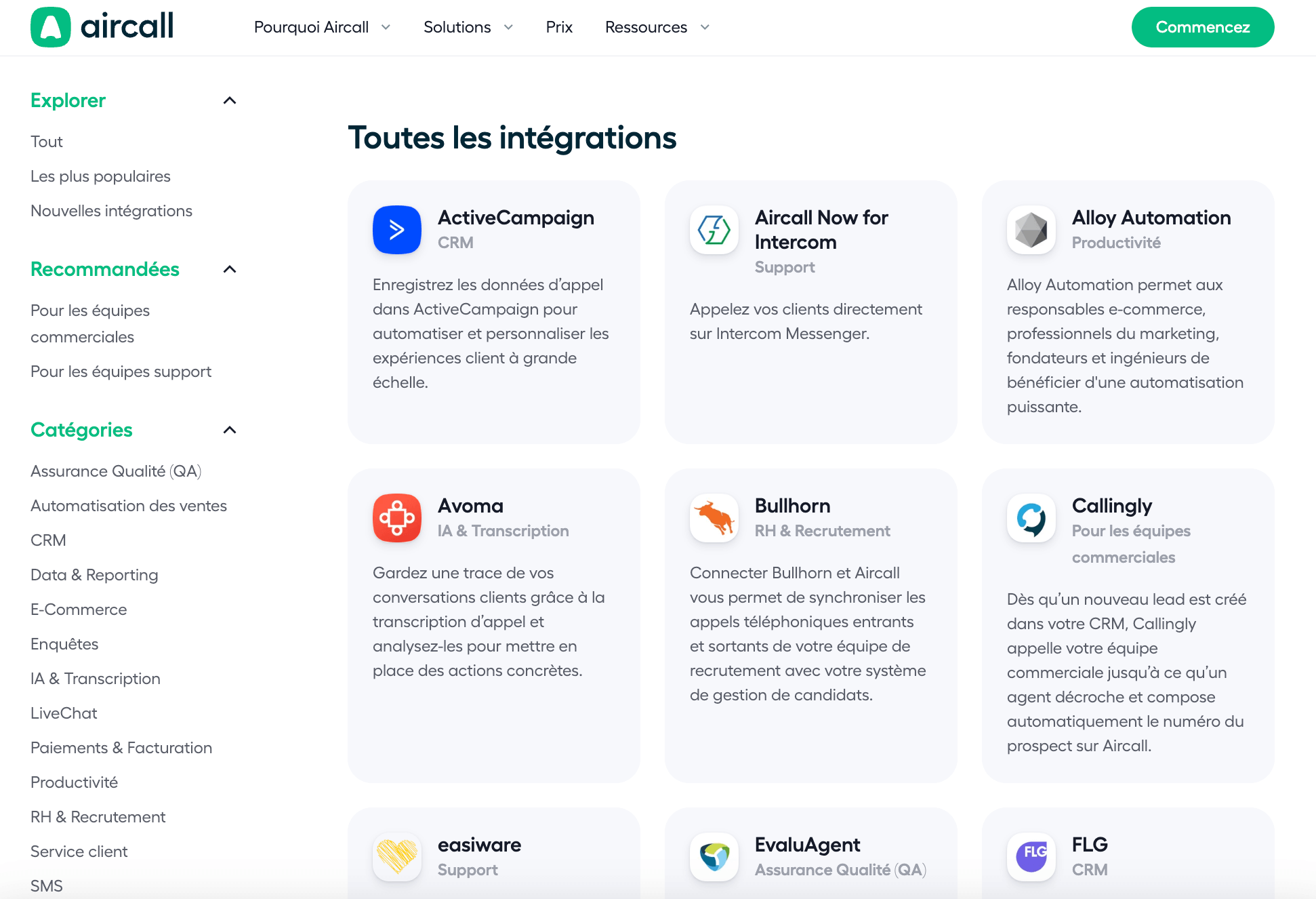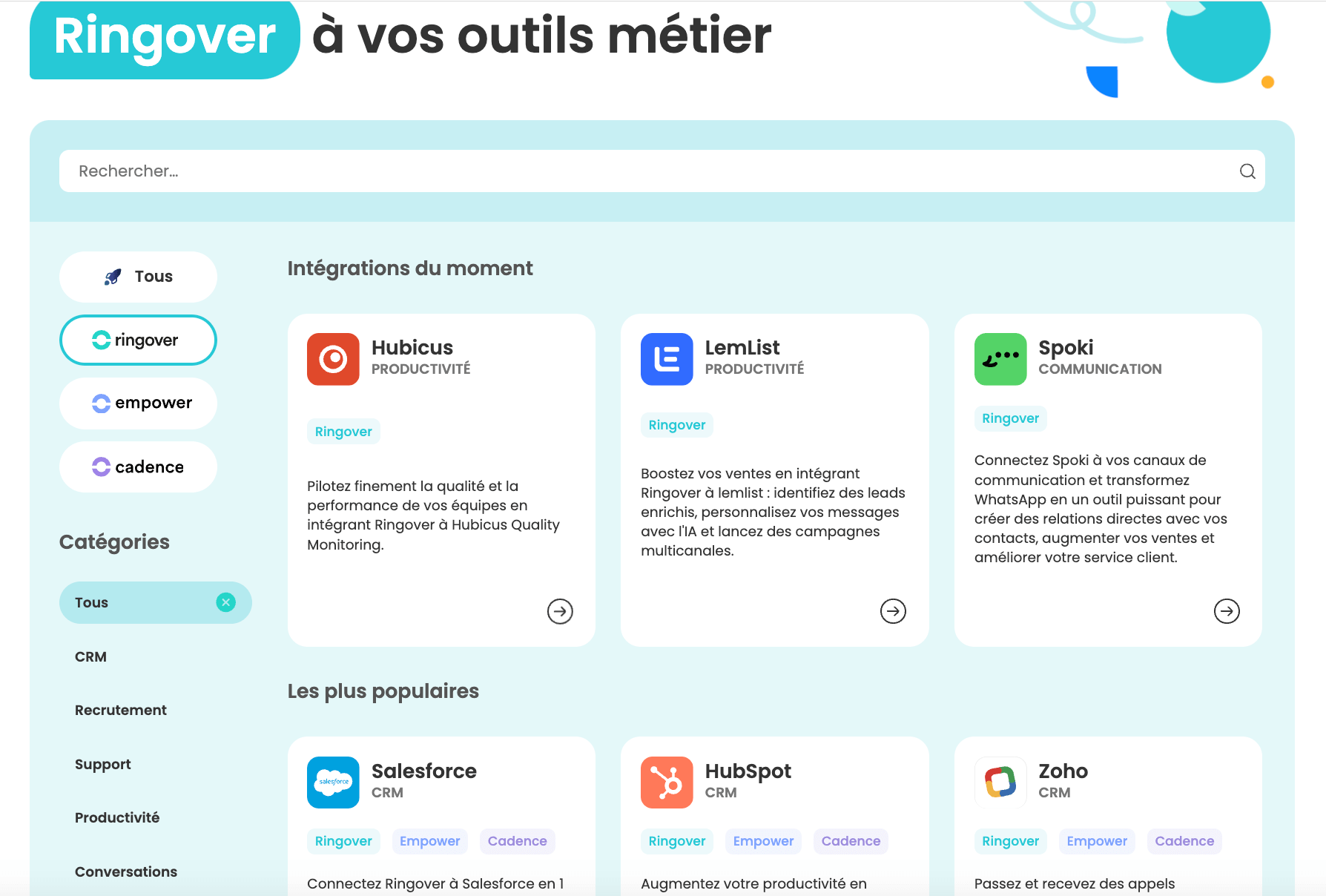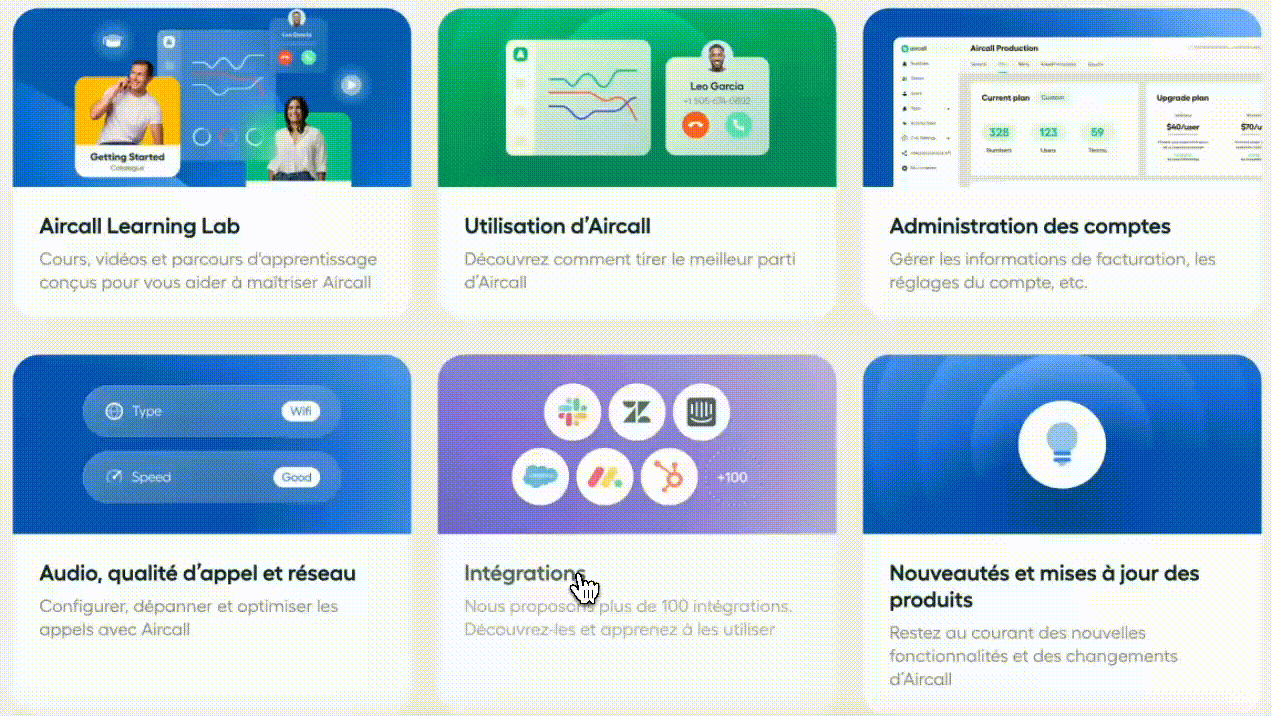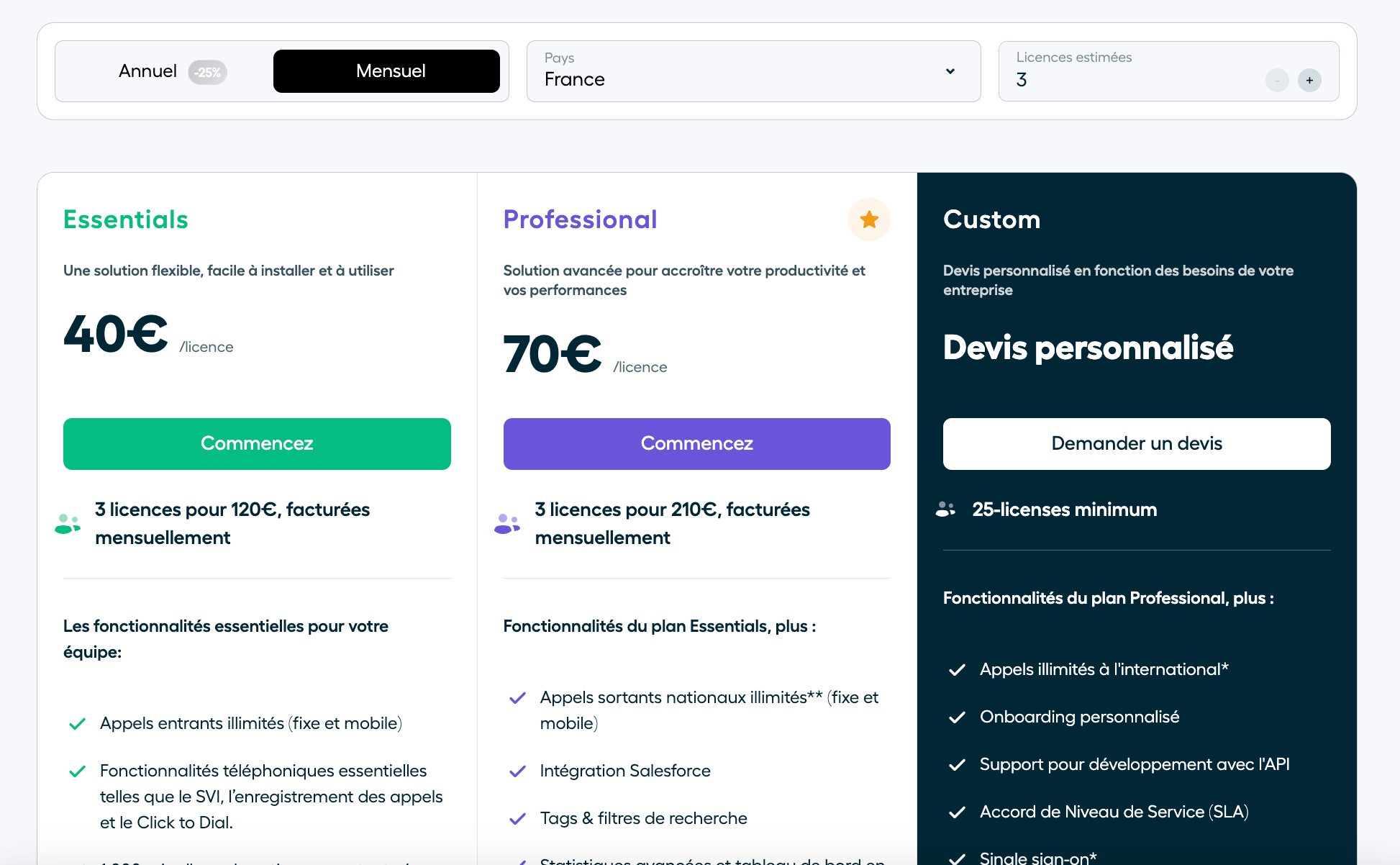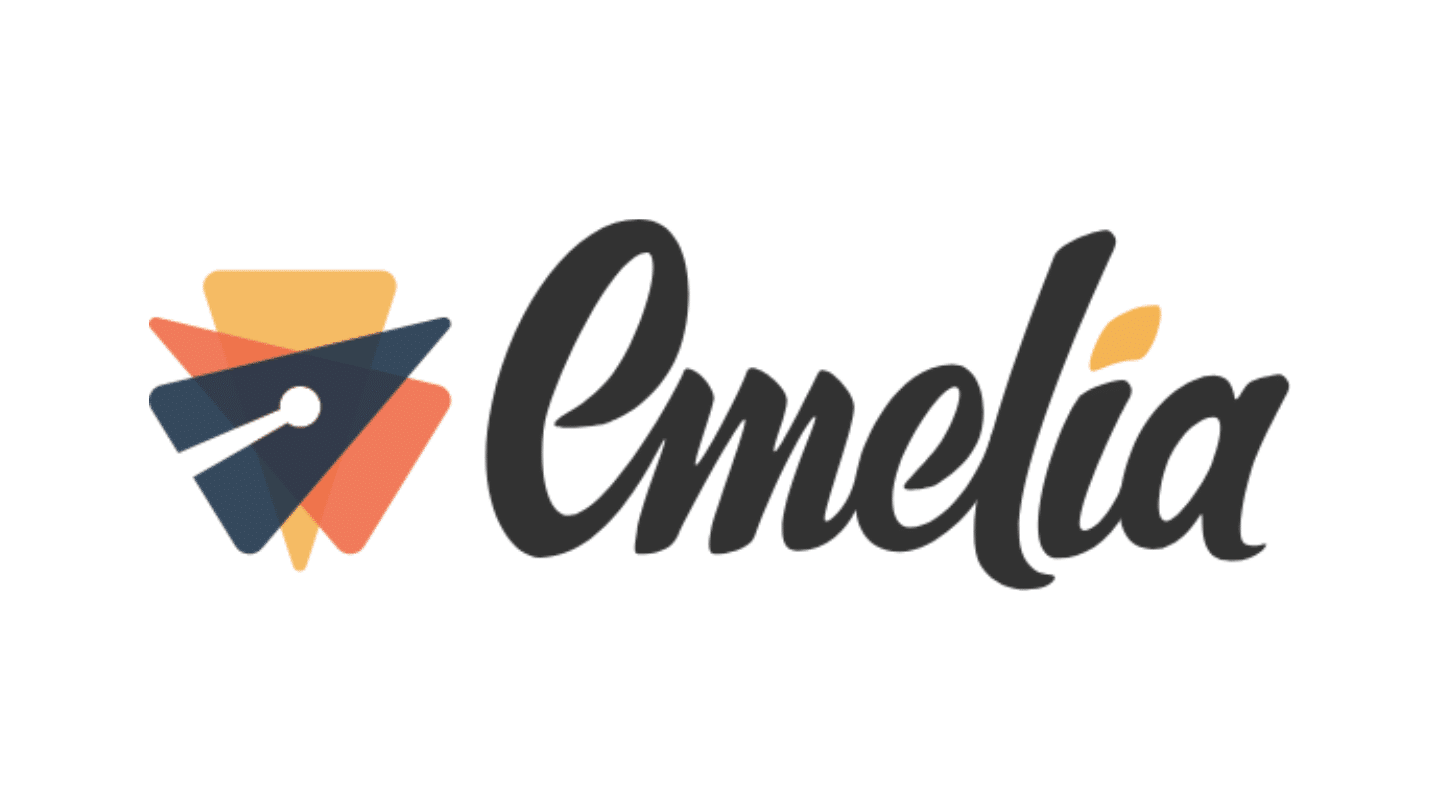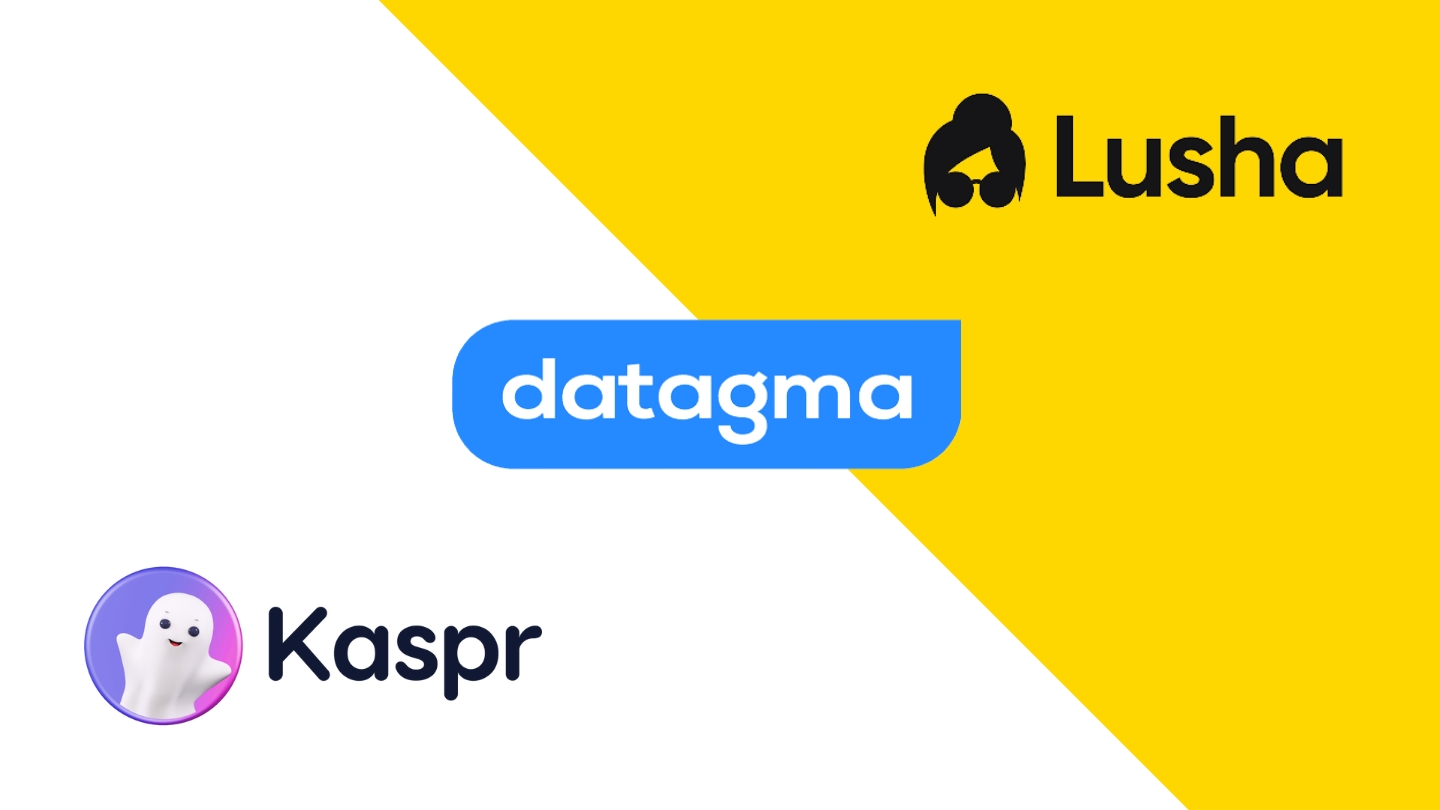Ringover and Aircall are two top-tier cloud telephony solutions. Both consistently rank among the best cold calling software and VoIP platforms available today.
Ringover vs Aircall: Which solution is right for you?
In short: Aircall is more feature-rich, while Ringover is simpler and more intuitive.
If your team handles large volumes of outbound calls or requires advanced monitoring tools, Aircall is the better fit.
For small to mid-sized businesses seeking a user-friendly, efficient, and budget-conscious solution, Ringover is a perfect match.
Both tools are powerful, developed in France, and integrate seamlessly with leading business platforms (CRM, ticketing systems, etc.). The question isn’t which one is objectively better—it’s which one better suits your needs.
This article will help you decide, with a comprehensive comparison of features, integrations, customer support, pricing, and user feedback.
Sommaire
Ringover vs Aircall – Comparison chart
| Solution |
Ringover |
Aircall |
|---|---|---|
| Ideal for | Small businesses and teams looking for a simple, quick-to-deploy, and easy-to-use solution. | Companies with more complex telephony needs, especially for high-volume sales or support operations. |
| Our opinion | A great balance between functionality, ease of use, and affordability. | A more powerful and scalable platform. |
| Call management | Covers all the essentials, with simple and accessible setup. Ideal for teams looking to professionalize without added complexity. | Designed to meet advanced needs, with more sophisticated call handling capabilities. |
| Customer relationship management | Provides effective tools for tracking interactions and maintaining context—adequate for most small businesses. Personalization options are more limited. | Better suited to advanced CRM workflows: calls are contextualized, intelligently routed, and enhanced with smart automation. |
| Reporting & analytics | Straightforward summary dashboards focused on individual performance—ideal for quick and clear oversight. | More advanced monitoring, with detailed dashboards, filters, and insights into peak activity periods. |
| Integrations | Over 90 integrations with leading CRM and helpdesk platforms (HubSpot, Zoho, Zendesk, Freshdesk…). | More than 100 native integrations, including Salesforce, HubSpot, Pipedrive, Shopify, and a variety of business APIs. |
| Customer service | Support is available on weekdays via email and phone. Online help center is relatively limited. | 24/7 customer support, responsive teams, and a well-documented help center. |
| Rates | Starting at €19 per user per month. | Starting at €30 per user per month. |
| Discover |
Try for free to compare solutions
Aircall offers a free trial, and you can contact Ringover for a free demo. Take this opportunity to test both leading cloud telephony platforms for yourself.
Ringover vs Aircall – Comparison of key features
#1 Call management
When it comes to call handling, both Aircall and Ringover cover all the basics: high-quality audio, international numbers to establish a local presence, click-to-call from any interface, intelligent routing, call recording, and more.
However, Aircall offers more granular control. It features advanced options for managing incoming calls, including queuing systems, routing based on agent skill or contact history, and even built-in voice analytics.
Ringover, in contrast, emphasizes simplicity. Its interface is streamlined, routing rules are easy to configure, and the entire system can be deployed rapidly. It may not offer the same level of customization as Aircall, but it covers 90% of use cases—especially for small and mid-sized businesses.
If you’re running a contact center or a team with complex supervision and call-handling needs, Aircall is likely the better choice. But for a fast, effective setup in an SME or startup environment, Ringover ticks most of the boxes.
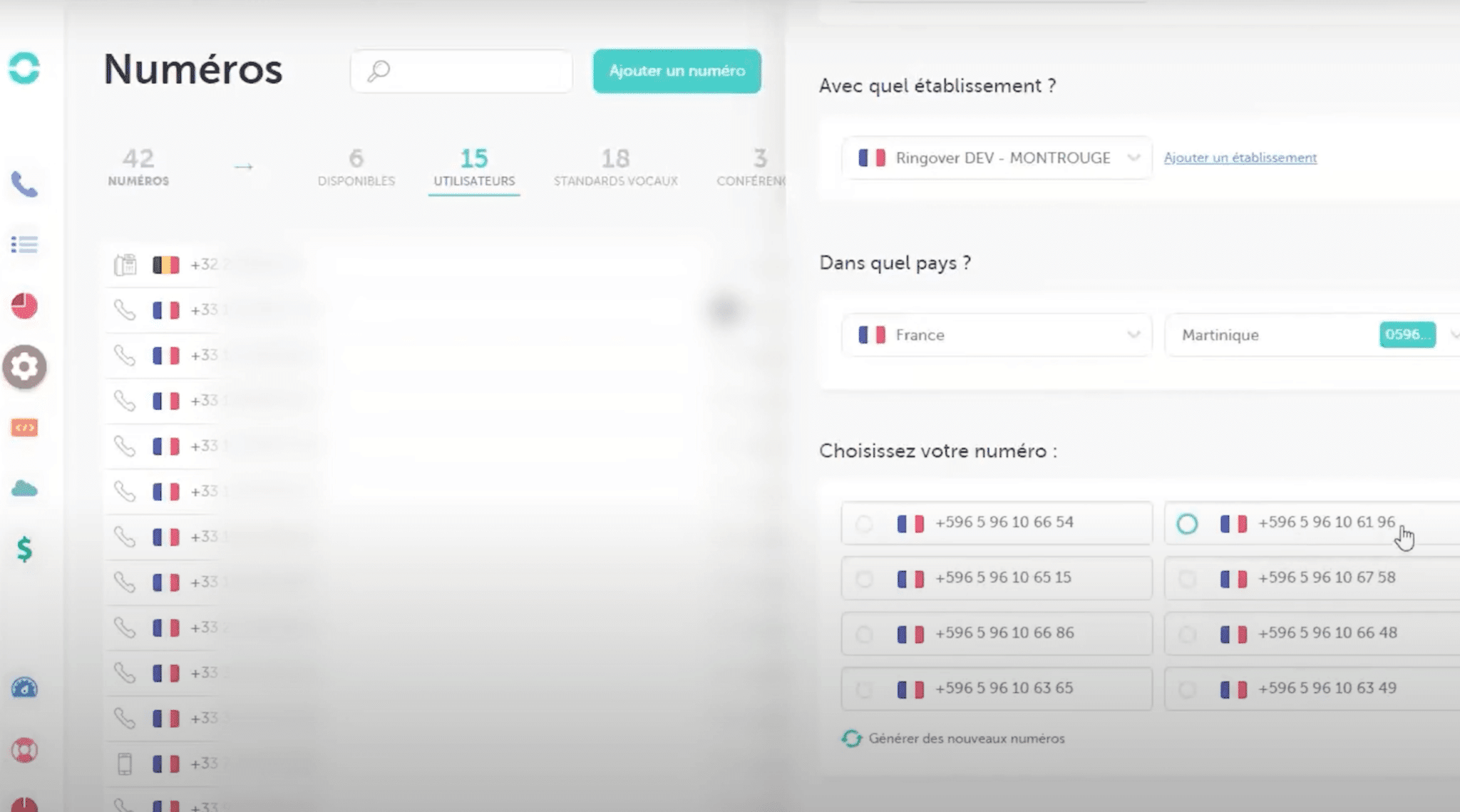
Try for free to compare solutions
Aircall offers a free trial, and you can contact Ringover for a free demo. Take this opportunity to test both leading cloud telephony platforms for yourself.
#2 Team productivity
Beyond call handling, both Aircall and Ringover provide a suite of tools to boost team productivity—especially for call centers and sales teams.
Each platform supports internal collaboration through tools like chat, video calls, and screen sharing.
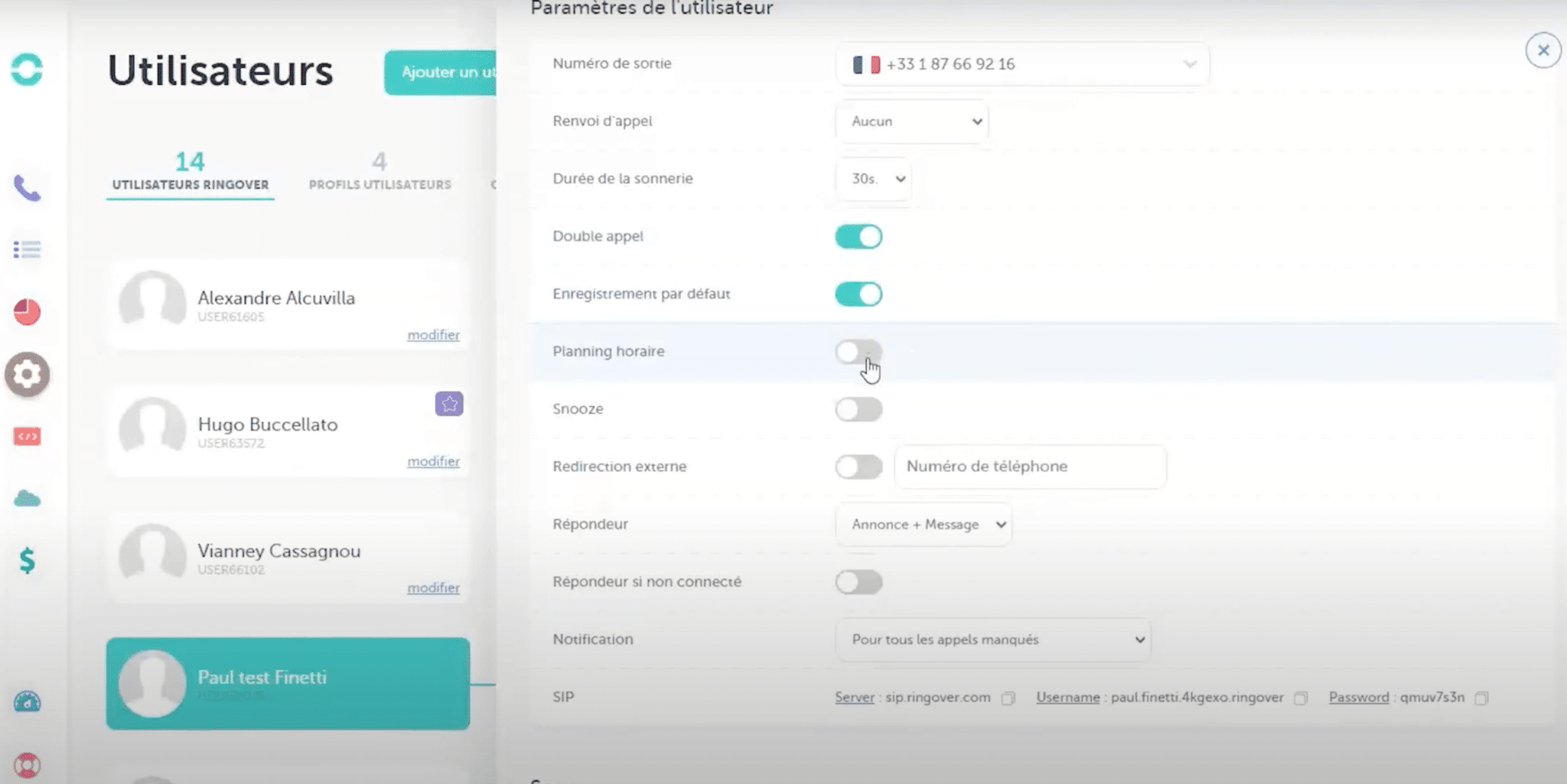
Aircall stands out for supervisors, offering real-time call monitoring, whisper coaching, and the ability to jump into live conversations when needed.
Ringover takes a more high-level approach, focusing on dashboards and metrics like total communication time per agent.
Both tools also support features such as call scripting and power dialing to automate repetitive outbound call tasks.
Aircall has the edge in terms of overall productivity tools, but Ringover still provides everything most small businesses need.
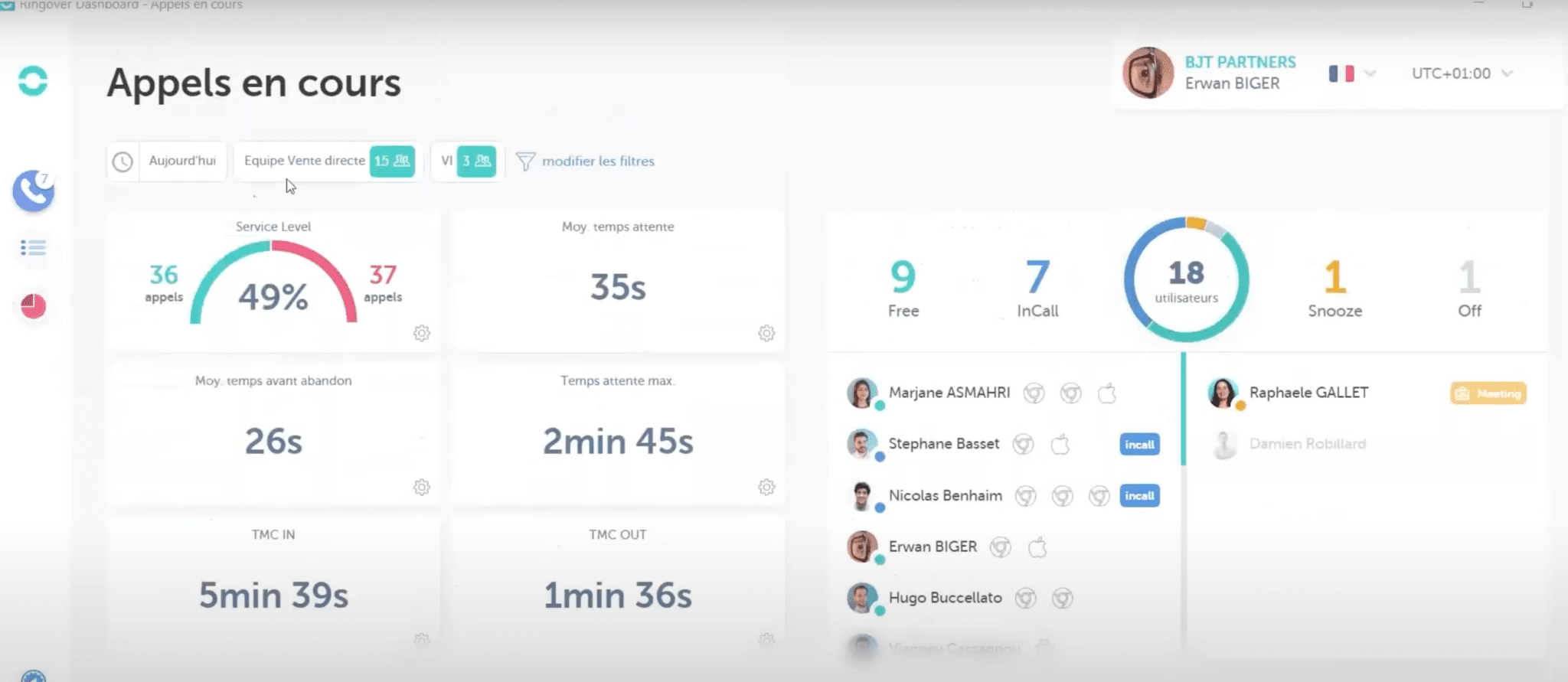
#3 Customer relationship management
Each contact’s history is centralized, with logs of incoming and outgoing calls, replayable recordings, and access to transcripts.
Agents can take notes directly in the system and tag calls to better organize follow-up (e.g., “To call back”, “Complaint”).
Real-time alerts notify agents when a key contact tries to reach them, helping prioritize high-value interactions.
Aircall takes it a step further, automatically assigning calls based on previous interactions. For instance, if a strategic prospect calls again, the system can route the call to the rep they already know—boosting continuity and personalization.
#4 Reporting and analytics
Both platforms provide rich dashboards accessible directly from the main interface.
Supervisors can monitor real-time metrics such as call volume, average duration, and pickup rate. It’s also possible to segment this data by agent, team, or time period.
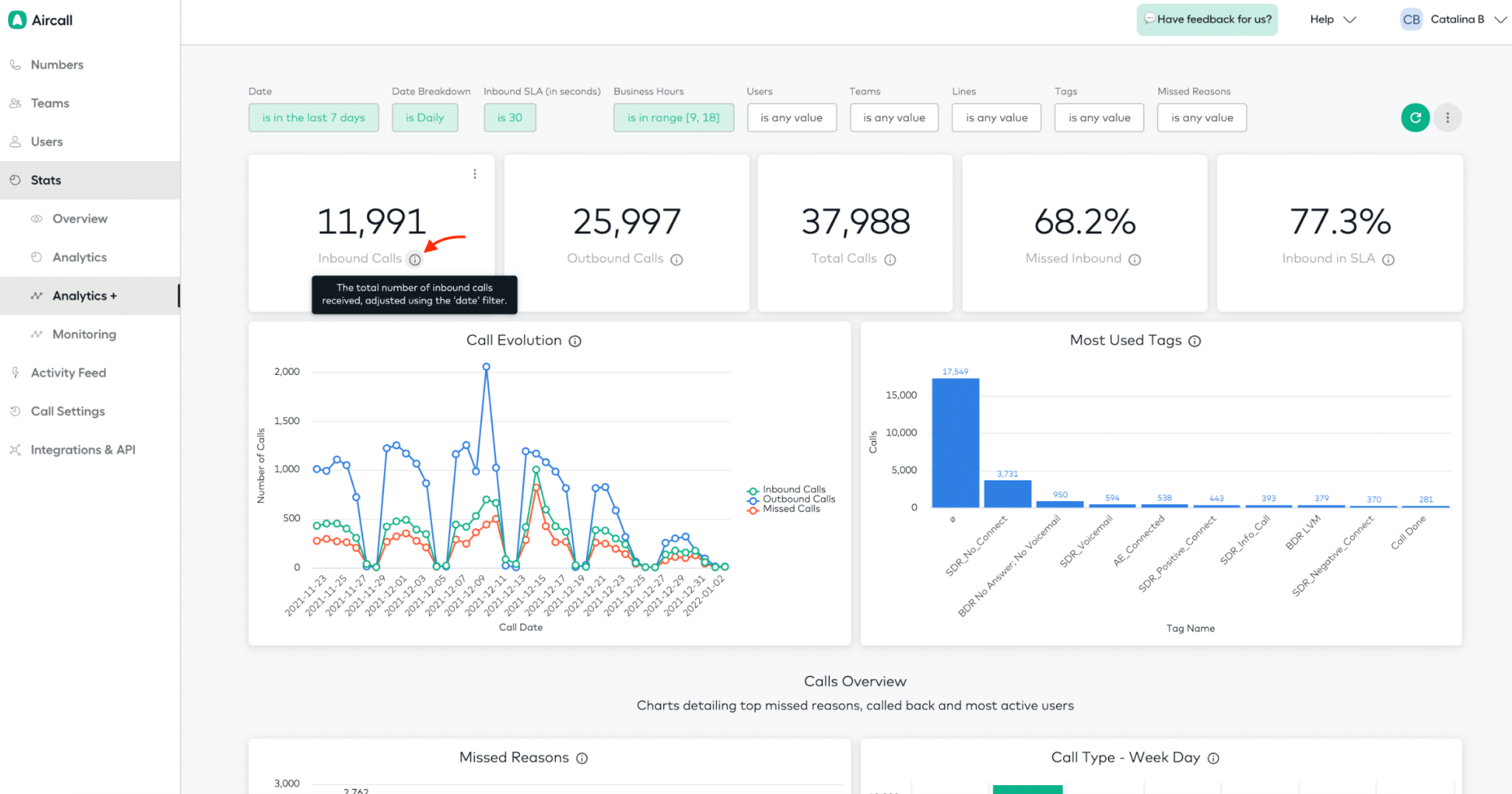
Aircall offers particularly strong tools for analyzing call durations. It helps identify peak hours for better staffing and flags unusually long calls to uncover potential issues.
Ringover, meanwhile, focuses more on individual performance monitoring, with customizable leaderboards and agent-specific goals.
Every action is logged, making it easy to identify top performers and those in need of support.
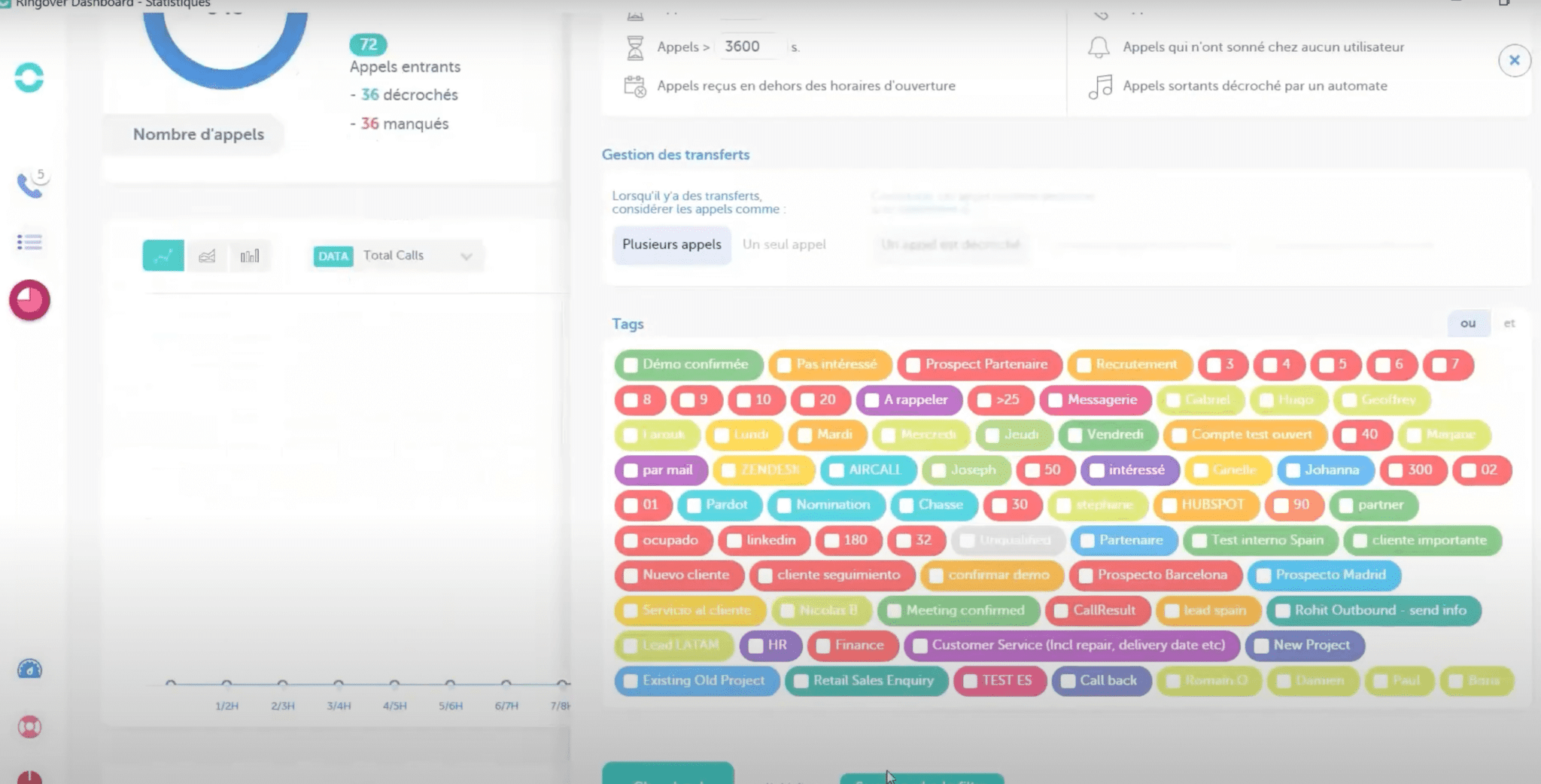
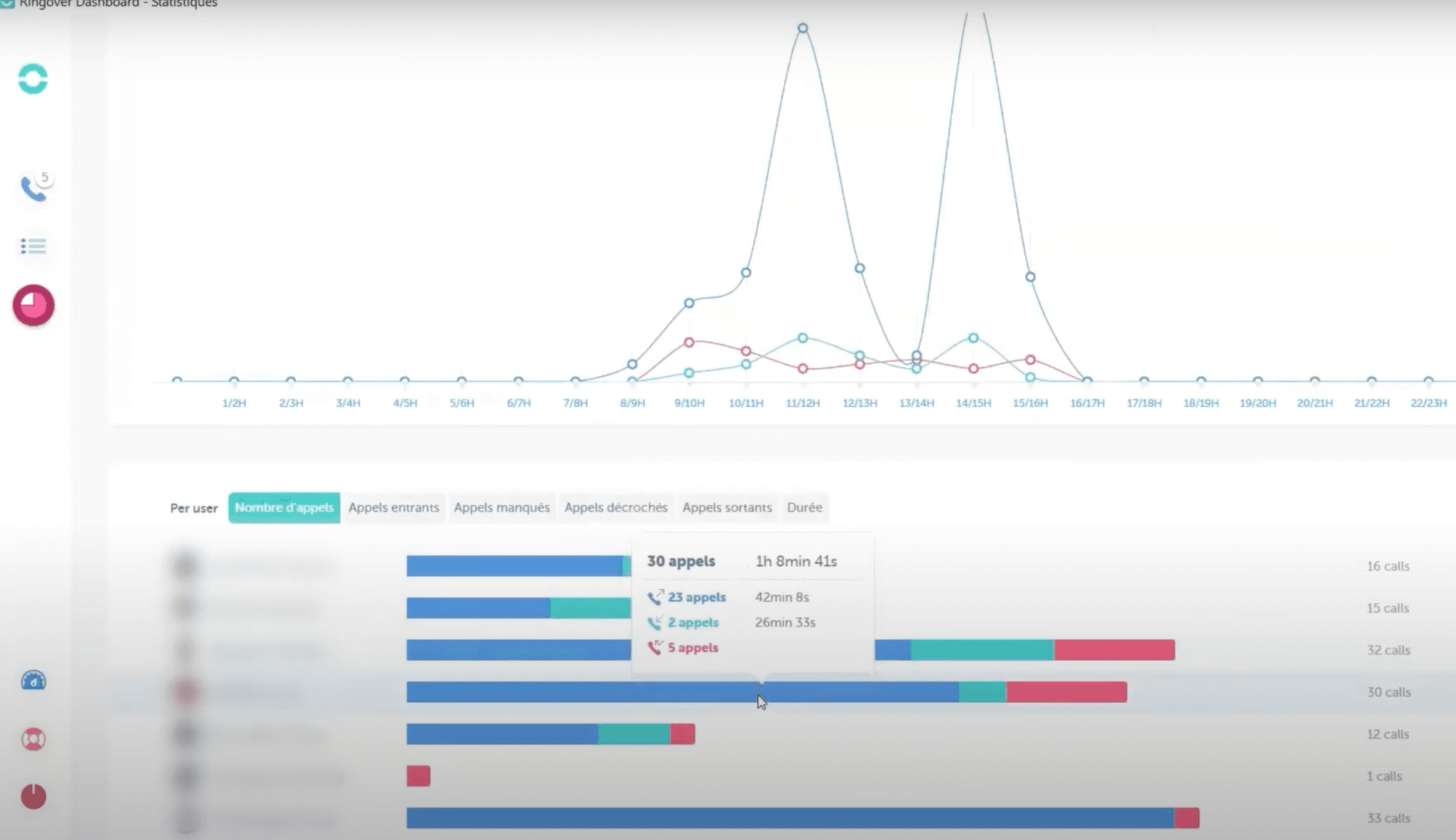
Both platforms are well-equipped when it comes to reporting and analytics, though Aircall takes a slight lead with more advanced and user-friendly dashboards.
Try for free to compare solutions
Aircall offers a free trial, and you can contact Ringover for a free demo. Take this opportunity to test both leading cloud telephony platforms for yourself.
Ringover vs Aircall – Integrations
Both platforms offer seamless integrations with the most widely used CRMs on the market, including major players like Salesforce, HubSpot, and Pipedrive. This allows your telephony solution to plug directly into your CRM system, enabling features like click-to-call and automatic call logging.
The same goes for customer support and helpdesk software: both Aircall and Ringover integrate with popular tools such as Zendesk, Freshdesk, and Intercom.
These integrations give your agents one-click access to all customer data and interaction history—directly from within the telephony interface.
Aircall offers over 100 native integrations with business applications, while Ringover supports slightly over 90.
Both platforms also offer APIs and webhooks, allowing you to build custom integrations with more niche or proprietary tools.
In short, no matter which business tools you use, you should be able to easily connect either Aircall or Ringover to your existing tech stack.
Ringover vs Aircall – Customer service
Customer support is a key factor when choosing a VoIP telephony solution.
In this area, Aircall outperforms Ringover. Its technical support is available 24/7.
With teams based in Paris and New York, Aircall provides support via phone, email, and live chat—with impressively fast response times.
It also offers a comprehensive online help center filled with guides and tutorials. You’ll also find a detailed knowledge base, access to webinars, and a vibrant online community.
Ringover provides support during standard business hours. Their support team, based in France, is available via phone and email. However, customer reviews suggest the experience can be inconsistent, with occasional delays in response time.
Ringover’s online knowledge base includes the essentials for getting started and resolving simple issues—but it’s more limited when it comes to advanced or specific use cases.
In this category, Aircall is clearly the stronger choice.
Try for free to compare solutions
Aircall offers a free trial, and you can contact Ringover for a free demo. Take this opportunity to test both leading cloud telephony platforms for yourself.
Customer reviews of Ringover and Aircall
We analyzed user feedback for Aircall and Ringover on the G2 review platform. Both tools receive high average ratings: 4.3 stars for Aircall(1,180 reviews) and 4.7 stars for Ringover(214 reviews).
Top strengths highlighted by Aircall users:
- Reliable call quality, even with high call volumes. Users appreciate the platform’s stability.
- Highly intuitive interface that’s easy for teams to adopt. The dashboard receives consistent praise.
- Extensive integration capabilities, especially with leading CRMs like Salesforce and HubSpot.
- Responsive and knowledgeable customer support—Customer Success Managers often receive special mentions.
What users appreciate most about Ringover:
- Excellent value for money. As detailed below, Ringover is more affordable than Aircall.
- Simplicity and ease of setup. Smaller businesses especially like how quickly they can get started.
As for areas of improvement, some Aircall users mention the lack of a manual dial pad and minor bugs in the mobile app.
On the Ringover side, occasional connectivity issues are noted, with a few users reporting outages.
That said, overall feedback for both Aircall and Ringover is overwhelmingly positive. These are two highly reputable and reliable solutions.
Going further
Ringover vs Aircall – Offers & Rates
Both Aircall and Ringover operate on a subscription model based on the number of users—similar to what most CRM providers use.
Aircall offers three main plans:
- The Essentials plan at €40 per user per month. Designed for SMEs and startups handling a moderate volume of calls, this plan includes unlimited calls, customizable IVR, click-to-call, desktop and mobile apps, and access to most integrations.
- The Professional plan at €70 per user per month. Targeted at businesses with more advanced requirements, this plan adds productivity tools like the power dialer, coaching features, and additional integrations (including Salesforce products).
- The Custom plan is tailored for large contact centers with high call volumes. Pricing is based on a custom quote after a needs assessment. This tier includes unlimited outbound calls, advanced call routing, and premium support with a dedicated Customer Success Manager and SLA guarantees.
Ringover also provides three pricing tiers:
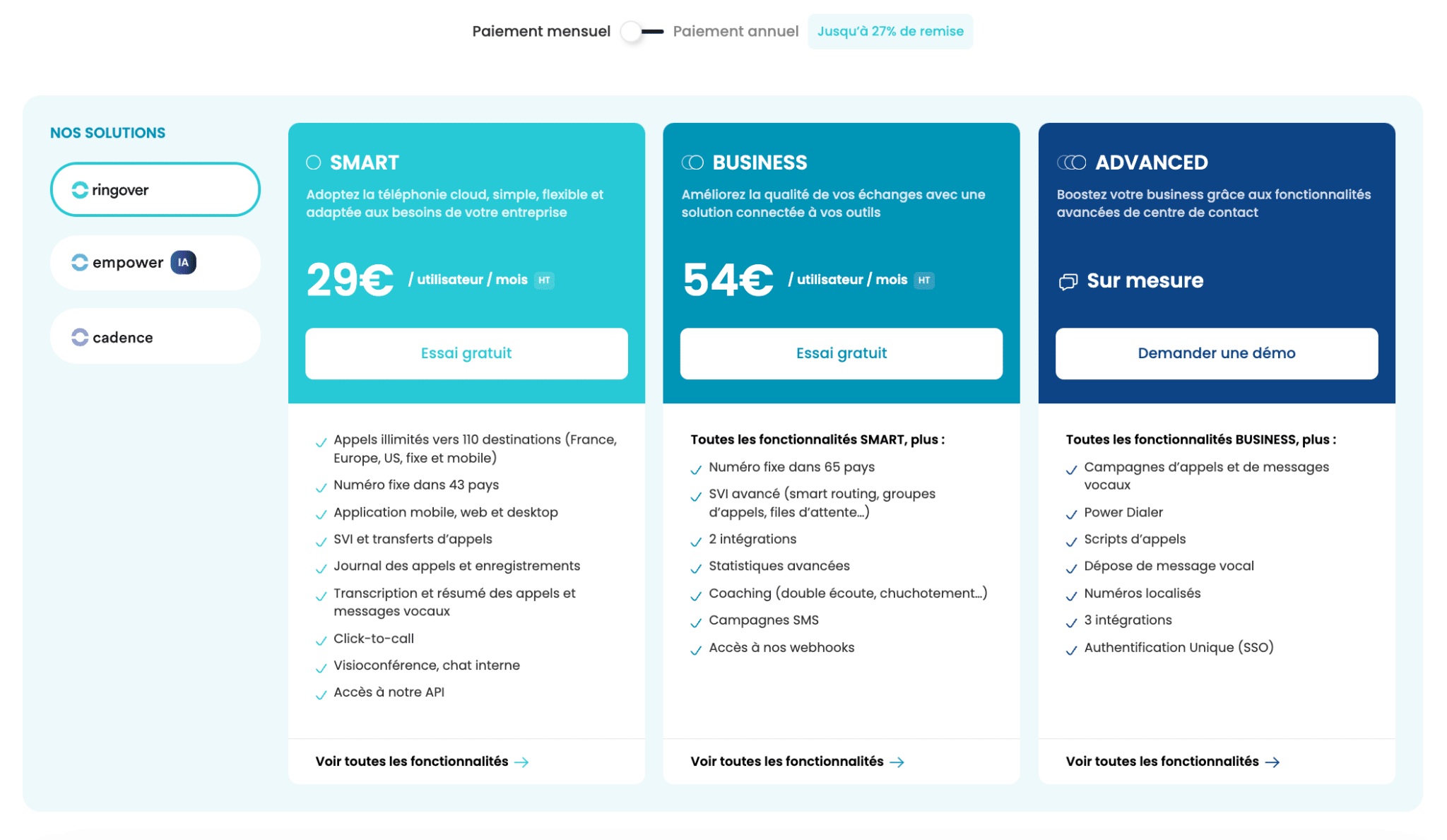
- The Smart plan at €29 per user per month. Best suited for freelancers, startups, and small teams. It covers all the basics: unlimited calls, one-click dialing, call logs, mobile apps, and softphone access.
- The Business plan at €54 per user per month. Aimed at SMEs with more demanding needs. It includes an advanced IVR system, detailed analytics, and the ability to choose two integrations (CRM, helpdesk, etc.).
- The Advanced plan is available on request and targets larger companies and call centers. It builds on the Business plan with additional features like a power dialer, call scripting, voicemail drops, local numbers, and SSO (Single Sign-On).
Note: Both Ringover and Aircall offer a 25% discount on annual billing.
Overall, Aircall is around 30% more expensive than Ringover.
Try it for free to compare solutions
Aircall offers a free trial, and you can contact Ringover for a free demo. Take this opportunity to test both leading cloud telephony platforms for yourself.

